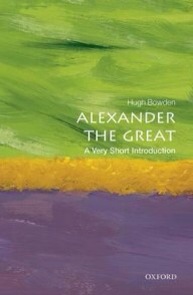This is a transcript (though not perfect!) of Hugh Bowden’s great (very short) talk about Alexander the Great, from the Heffers Classics Forum 2014. Click on the book below to buy his excellent Very Short Introduction.

I want to talk about war in Iraq, fighting in Syria, attempts to control Afghanistan, incursions into Pakistan and Iran, and I want to talk about them 2,340 years ago.
And the point I want to make about them is that 2,340 years ago, these events were very different from what they mean now.
And I want to make the point that it is a failure to understand that difference that has possibly left us in the condition we’re in now.
It’s a cliche to point to British involvement in Afghanistan, which has just this week come to an end, and say, “Afghanistan is ungovernable: Alexander the Great attempted to control it too.” It’s a great temptation to say, “These are ungovernable barbarian lands.” But actually, the world is rather different from that, or the world WAS rather different from that.
2,340 years ago, Afghanistan was part of a powerful empire that stretched from the Aegean to the Indus. It was a well-run empire; it was a powerful empire, and it was an incredibly wealthy empire. And into that land came Alexander the Great, and again, there’s a tendency to say, “Well, here is Western intervention in the East all those years ago!” or to say, “Here is Greece: a pupil of Aristotle coming to civilise the East!”
And that was said in the past. Nowadays we’re more likely to say, “Here is some Balkan warlord trying to impose his superficial ideas on an ancient and fading empire.” And this is equally unhelpful.
Alexander the Great came from the kingdom of Macedon that was created by the Persians. Just before 500BC, the Persian king Darius crossed into Europe and as part of his control of the area he created the Macedonian noblemen Amyntas as satrap of that area.
That kingdom continued, years afterwards, to look to the palaces, to the courts of the Persian East, as a source of an idea of how to rule.
Even Alexander’s father Philip looked to the East for a model for control.
And the reason this matters is because the campaigns of Alexander the Great are not the campaigns of West vs East. This is a battle between rival civilised orders who understood each other far better, perhaps, than more recent peoples who have intervened in engagements in the Middle East.
When Alexander invaded, he was seeking the kingship of Asia, a loose term but one that would have been understood by his contemporaries and would, in a different way, be understood by those who thought the Persians had taken over from the Babylonians and Assyrians.
So Alexander was not a Western interloper; he was someone who came to the East to claim a right he thought he had earned, but he came with an understanding of what he was doing.
When he reached Egypt, he went through the process that was required to recognise the Pharaoh.
When he went to Babylon, he took part in the Spring festival.
When he came to Susa, he was enthroned on the throne of the Persian king, wearing Persian dress.
He became part of the ruling elite of an empire that was now under Macedonian control.
Now, this is not a story that you may be familiar with. This is not the story that most histories of Alexander tell. Why am I trying to tell you a different story? Because it’s true. But why do we have such a false impression of Alexander is the Romans. It suited the Romans to present the Persians as the enemy, because to the East of the Euphrates was a territory they tried and failed, and tried again and failed again to take. For the Romans the lands to the East of the Euphrates were the lands of the barbarians. And it was the Romans who wrote most of what we read about Alexander today.
We rely on the Romans’ understanding of this world. They were a people skilled in warfare, skilled in conflict, and perhaps a little unwilling to understand, a little too ready to fight.
And it’s because Alexander became a hero, a model in different ways to different Romans, both positive and negative, that it became important to present Alexander as fighting a barbarian, non-Roman enemy.
And one of the things that we need to do, if we are to understand what has gone wrong now, is to recognise the misunderstandings of history, and try not to make the same mistake again and again.
The misunderstanding of history begins when we start to shape the past in the image of the present, and then say that we are shaping the present in the image of the past. The Romans started the process; it’s carrying on now: every time anyone crosses the Euphrates, any time anyone goes into Syria, or Iraq or Iran, or Afghanistan, it’s bound to end in conflict. But that isn’t the case, and Alexander, properly understood, seen through the eyes of his contemporaries, is a model for other ways of behaving.
Yes, he was a great general. Yes, he was engaged in a mission to gain control. But he was fighting on equal terms with the likes of Darius the Persian. He was going there understanding what he was doing.
War was endemic in the ancient world: pretty well endemic in the modern world. But conflict, if it comes without understanding, is not going to achieve anything.
I am not offering you Alexander as a model, but I am offering you the Alexander of history. The misunderstanding of Alexander is something that bedevils subsequent history and conflict.

This makes it sound a lot more coherent than I remember it being at the time.
LikeLike
It was great.
LikeLike